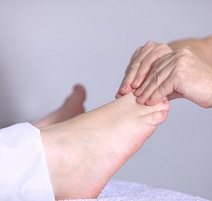![]()
 The peripheral nervous system serves the areas in the extremities of the body. The nerves within that system provide a number of functions, depending upon which one is being affected. Typically, nerves can be classified as sensory (receiving sensation), motor (controlling muscle movement) and autonomic (regulating functions such as heart rate and blood pressure). One of the issues that may occur with those nerves is peripheral neuropathy. A number of symptoms of the condition may be experienced.
The peripheral nervous system serves the areas in the extremities of the body. The nerves within that system provide a number of functions, depending upon which one is being affected. Typically, nerves can be classified as sensory (receiving sensation), motor (controlling muscle movement) and autonomic (regulating functions such as heart rate and blood pressure). One of the issues that may occur with those nerves is peripheral neuropathy. A number of symptoms of the condition may be experienced.
Peripheral neuropathy is an issue in which the peripheral nerves are damaged. This often leads to symptoms that are associated with either the hands or the feet, but it may also affect more than one area or other parts of the body as well. Medication is often prescribed to reduce the pain associated with peripheral neuropathy, but it does not cure the problem.
An issue with peripheral neuropathy may occur any number of different reasons. The nerves are often damaged as a result of metabolic problems, traumatic injuries, exposure to toxins and it can be an inherited problem. One of the more common issues that can result in this condition is diabetes, and many individuals suffer from this issue in their feet when they have severe diabetes.
Some of the common signs and symptoms of peripheral neuropathy include the following:
- Pain that is often described as sharp, throbbing, burning or freezing.
- Sensitivity to touch, considered extreme
- Tingling, pricking or numbness in the hands or feet. This problem tends to come on gradually and may move upward into the arms or legs.
- A general feeling of un-coordination and falling.
- Muscle weakness and, in extreme cases when motor nerves are affected, paralysis.
There may also be times in which the autonomic nerves are the ones that are affected. This could result in different signs and symptoms, although it is still considered a problem with peripheral neuropathy. Those signs and symptoms include the following:
Variations in blood pressure, leading to lightheadedness and dizziness.
Issues with the bladder or bowels.
Digestive problems
Intolerance to heat
There are also different types of peripheral neuropathy. When it only affects one nerve, it is known as mononeuropathy. If there are two or more nerves affected, possibly in different areas, it is referred to as multiple mononeuropathy. A good example of mononeuropathy is carpal tunnel syndrome. If it is affecting many areas and nerves, it is known as polyneuropathy. Most individuals who suffer from some type of peripheral neuropathy can also be classified as having polyneuropathy.
The symptoms of peripheral neuropathy may come on gradually. Most people tend to experience it as an unusual weakness, pain or tingling in the feet or hands. If you experience these or any other symptoms, it is best to seek medical advice as soon as possible. As is the case with many health conditions, if you are able to have this issue diagnosed early, your doctor may be able to control the symptoms and perhaps even prevent additional damage from occurring in the nerves.
Many people are at risk for this condition. Some of the risk factors include poorly controlled diabetes, alcohol abuse, autoimmune diseases, infections, vitamin deficiencies, exposure to toxins, kidney disorders, thyroid disorders and family history.
The symptoms that you experience might not only be uncomfortable, they can also lead to additional complications. Those complications include trauma to the area, as you may not feel temperature extremes, the risk of infection and the possibility of a lack of balance and falling.
If you are experiencing these symptoms, contact a physician. There are treatments available to help control the discomfort and other issues that are associated with peripheral neuropathy.


 OneCareNow is a general weblog that was created by several writers with a specific goal in mind: To offer one place that covers important topics which people really care about.
OneCareNow is a general weblog that was created by several writers with a specific goal in mind: To offer one place that covers important topics which people really care about.![Back Pain Breakthrough by Palmer & Dr. Young [2024 Review]](https://www.onecarenow.org/wp-content/uploads/2021/02/Back-Pain-Breakthrough-Young-Amy-50x50.png)
![Vincent’s Midas Manifestation System Review [Updated 2024]](https://www.onecarenow.org/wp-content/uploads/2021/02/Midas-Manifestation-50x50.png)
![The NEW Happiness Code by David [Updated 2024 Review]](https://www.onecarenow.org/wp-content/uploads/2021/01/The-NEW-Happiness-Code-50x50.png)
![Michael Christianson’s Manifestation Sigil Review [2024]](https://www.onecarenow.org/wp-content/uploads/2021/01/Manifestation-Sigil-50x50.png)
